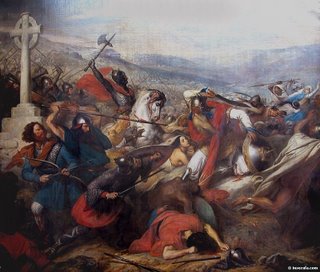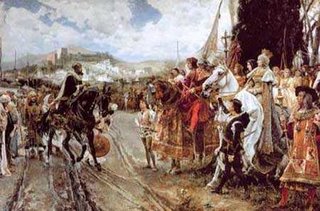Anniversaries

I need to get rid of the sinister spectres in the photos below. So how about a history lesson.
On Saturday it was the 940th anniversary of the Battle of Hastings. The norman conquest of England. A significant event that altered the course of our history. The last time any foreign power conquerered England in fact. Wikipedia offers quite a decent summary - 'the conquest linked England more closely with Continental Europe, lessened Scandinavian (saxon) influence, created one of the most powerful monarchies in Europe, created the most sophisticated governmental system in Western Europe, changed the English language and culture and set the stage for English-French conflict that would last into the 19th century'. In fact i like the way they phrase this part: 'Anglo Norman and French political relations became very complicated and somewhat hostile after the Norman Conquest'. Not sure why but the manner of King Harold, last anglo saxon King of Englands' death for some reason remains my earliest school (lesson) memory...probably because it was quite gruesome. (He was killed by an arrow in the eye). I can still 'hear' our teacher recounting the story now.
When i was about 14 we went to Normandy to see the Bayeux Tapestry - a 230 foot long elaborately embroidered cloth which depicts the battle. It was arguably commisioned by Mathilde, William The Conqueror's wife. On the way we stopped at a French market town and besides bothering the French waiters, my 'best friend', horrified at seeing crab upon crab cruelly stacked alive onto a market stall, bought one with a view to releasing it back into the sea at the earliest opportunity. Unfortunately it stank the school coach out as he slowly capitulated. She was forced to bury it in a sand dune. After giving the crab a good sending off she spotted some French garcons selling rides on dune buggies. With half an hour to spare before we had to return to the coach on our afternoon off, she handed over all her francs, lied about her age and set off. Ten minutes later she flew over a dune and over the handle bars and broke both her arms. The other thing I remember about that trip is that my sister was sporting the uber cool Diana look (wedge).
Anyway. The other battle that has an anniversary this month took place on the 10th in the year 732.
The Battle of Tours also called the Battle of Poitiers - which Steve at Pub Philosopher remembered. Muslim forces had crossed into Spain & 'but for Charles Martel's victory, things could have been very different'. Leader of the Christian army that prevailed at Tours, Charles the Hammer was Belgian. The illegitimate son of the curiously named Pippin the Middle and his concubine 'Alapaida', he emerged as a 'giant figure of the Dark Ages'. So there you go. Interesting point in time for Labour to pick its own battles. Long may those continue.
I went on to read up and remind myself about the Reconquista when Isabella was on the throne, becoming the successful patron of Christopher Columbus and regaining Spain from the Moors. The messy and bloody side of all this was of course the Inquisition where muslims and jews were forced to be either baptized or expelled.
I really like this part though: 'During their reign they (Ferdinand & Isabelle) supported each other effectively in accordance to their joint motto of equality. When you read about Isabella and for that matter Elizabeth I, saviour of England, you wonder - (the vote aside) who needs feminism?
Tanto monta, monta tanto, Isabel como Fernando
"They amount to the same, Isabella and Ferdinand"
"Spain was united, the crown power was centralized, the reconquista was successfully concluded, the groundwork for the most dominant military machine of the next century was laid, a legal framework was created, the church reformed. Even without the benefit of the American expansion, Spain would have been a major European power. Columbus' discovery set the country on the course for the first modern world power""They amount to the same, Isabella and Ferdinand"




11 Comments:
I love all you bloggers, I am revisiting history on an almost daily basis. Yesterday had a great 'teach in' re the Turks and Armenians. It is all so very interesting to read. Wonderful love it.
LOL i loved the story about the crab too, nice little anecdote....
You're a little late with the bit about Hastings as the anniversary was Saturday. Naughty girl, tut.
Although you could always say you're basing it on the Julian calendar I guess, in which case you're several days early, but don't ask me how early as I haven't the foggiest idea.
Now I've forgotten why I am writing the comment...
Oh yes, I was just going to say that the benefits of Norman occupation depend on your point of view really. Personally I see it as having been a bit of a disaster, being invaded by them, but then I am rather biased.
Plus, if you're interested in seeing pics or a bit of video of the re-enactment (no, I didn't take part or anything unfortunately)of the battle when it was staged at Hastings last Saturday then say the word and I'll drop you a couple of links to some websites.
Tell me why it was a disaster apart from the fact that they were French..im (genuinely) curious to get another perspective...pulling bits together here and there i got a mixed impression..eg the bit about the governmental system was interesting in that it existed before we were invaded but that the Norms took it and worked on it, so to speak. Is it true the Scandis and the French were in cohoots to weaken England btw? You'd be the person to advise on that, having read your blog!
Well, difficult to know where to start really, but first I'll copy something I wrote elsewhere on my blog and you'll start to get an idea:
European states ruled largely by autocracy, England was a fledgling democracy.
European mounted warriors learnt nothing but warfare from childhood, which was the cause of a number of social problems and helped explain the surplus of mercenaries over there. In England, warriors were expected to also be men of learning to one degree or another.
In Europe the ruling elite could do pretty much what they wanted, no matter how despicable. In England the concept was that every man, even the king, was subject to the law.
In Europe many of the ruling elite lived in castles built to withstand seige. In England the only fortifications found were usually simply to protect against robbers and wild animals.
And although in Europe succession was seen as a right of birth, in England again it was different. Succession was settled by a king or queen announcing, where possible, who they favoured as their successor and this choice was then discussed and voted on by the Witan.
Under the Anglo-Saxons most people had a voice. Complaints would be taken to freemen, who discussed it with the others in the monthly moot. If important enough it then went on to be discussed in the shires moot, and from there to the Witan, the group of wise men who had the ear of the king or queen. Under William that was lost. No-one had a voice apart from the Norman rulers. His quaintly described 'Harrying of the North' was in fact little more than attempted genocide. It's been estimated that as many as 300,000 men, women, and children died through either murder or starvation by William in the twenty years following his invasion.
In England, before the Normans, men and women were considered pretty much on a level footing. In Anglo-Saxon the word 'mann' wasn't really gender specific in the way it is today, it simply referred to a person and that person could be either male or female. Under the Normans that equality was taken away, and women lost their autonomy. It's taken until the modern era really for women to get back many of those rights which, under the Anglo-Saxons, were considered perfectly normal.
Anglo-Saxon buildings and structures were designed to blend in with the landscape. However, the Norman buildings were designed to impose and remind everyone who was running the show. All positions of authority were replaced by Normans who had little or no understanding of English culture and no desire to understand it either. What culture in the way of learning and the arts can we ascribe to the Normans? Not much really. But when the same question is asked of the Anglo-Saxons its a totally different matter. They also had a sense of spirituality that was the envy of Europe, and the country was rich in material ways too, but the Normans stripped it bare like an invasion of locusts. They imposed laws that were designed to benefit themselves, and only themselves, castles sprung up everywhere and men could be thrown in dungeons simply on a whim. And many were.
Harolds intentions regarding the British Isles had been the hope that he could unite them politically, but through alliances and marriage wherever possible. In other words, peacefully. William and his family just brought conquest, death, and resentment. The Anglo-Saxons had many connections all the way down to Hungary, where some of the English royal family were living, and it seems safe to say that the English were not at all keen on the schism between the eastern and western churches of 1054, preferring it would appear to maintain loyalty with the Orthodox Church rather than a Pope who had suddenly decided that he was the voice of God. William offered the Pope total supremacy in England if he'd support his war against Harold, (without that support William's war hadn't been able to get off the ground), and he received the Popes backing completely who never even considered calling any of the English to hear their side of the story. The whole charade had been conducted in their absence. The result of this call to 'holy war' was that William now had no problem at all getting as many mercenaried to his side as he wanted.
I'll stop there now, otherwise I'll just go on and on and on, lol.
No, please continue! Fascinating stuff..some of it i was sort of aware of. I just figured the resulting amalgamation gave birth to a strong successful west...& eventually we did go on to reassert individual liberties with the Magna Carta and then the Bill of Rights...?
OK soon as I calm down.
Something has made me a bit angry and I'm having one of those *breathe* times right now, lol.
Good blog site.
A couple of things about the battle of Hastings,King Harold Godwinson was apparently hit in the eye by an arrow, but this did not kill him, he was hacked by Norman knights losing a leg and buried at Waltham Abbey,The Normans were descended from the Vikings and were not really French and evidence suggests it was Saxon women whom created the tapestry under Norman guides, although they left clues.
http://england-is-cool.blogspot.com/
I did read about the tapestry being created by the Saxons...but Normans being descended from the Vikings I wasnt aware of....cheers Ill check out your blog also. I like the name ;)
Sorry I never got back to you on this topic. I've been a little bit distracted lol. Anyway, I've stopped blogging now and, although I haven't shut my page down just yet, don't write there any more.
I've often wondered what the effect would have been had Harold II beaten William at Hastings and always felt a little bit unmoved by the Magna Carta as it seemed to have been more to do with the barons and their rights etc. rather than the rights of the ordinary man/woman, but I might be wrong. Much of Europe was appalled at what William had done, and believed that he and the pope were a party to murder. It's interesting to note the scale of the rebellion against the Normans that went on throughout England for about 20 years, on and off. The Scots tried to help the English, as did the Welsh, and the Danes. The French offered sanctuary to any Englishman who asked for it. There have been what could be termed 'benefits' which arose as a result of William's invasion, although they were a long time in coming, and one of them was a strong leadership and security. English is now one of the most expressive languages in the world with a vocab of about half a million words, but as regards the other subjects, they wouldn't have been able to let William live after what he had tried to do so would Harold have then obtained Normandy? Englands standing in Europe would have also been second to none, especially as it was the English under Harold at Stamford Bridge that had finally put down the Viking threat. And that was a threat that the whole of Europe had feared. Englands voice would have become louder and more dominant but without the brutality that the Normans were renowned for.
Post a Comment
<< Home